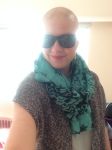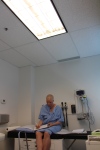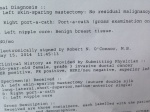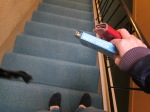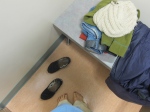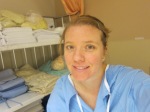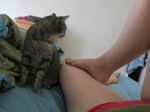So Callanish produced a film, about their retreats (one of which was so healing for me) and about six young women who have metastatic/recurrent cancer. Tonight, the film was screened. I went.
The film was beautiful. Shot in golden light. Edited carefully, with profiles of the young women portrayed with sunlight dancing on their cheeks and warm blurred moments and yellow daisies swaying in the wind and rose petals floating in a creek. The images were scrumptious, warm, and bathed in golden light. In many ways, these images reflected my own experience of the Callanish retreat: gorgeous, careful, golden, warm, full of heart.
The women told stories of times their doctors gave them weeks to live, they shared their decisions to get married and travel to India and do insane bike rides in the face of terminal diagnoses. They shared spirit, hope, and fears. They echoed the voices of other young adults I’ve known, and I felt many of their stories and worries and hopes deep inside my core. The film profiled a few of those professionals from Callanish who so beautifully receive spirits and bodies battered by cancer and who, through absolutely tender and amazing caregiving, heal the wounds the oncologists cannot see and awaken the souls of people who have been to hell and back. That part was so well-captured, and I could feel their care leaping out through the screen and enveloping us all. I know their care works, because it worked for me.
You know there’s a but coming though, don’t you? It’s a hesitant but. I don’t want to say anything critical about this wondrous place. I don’t want anyone to hear me utter a single word of not good-enough about these amazing people. But.
I could feel it in my chest, a tightening. I sat in a row of young adult cancer survivors, young people who have fast become close friends. We spent the afternoon together with lunch and lattes. We were stoic. Sometimes a tear escaped. Sometimes we held each others hands. Sometimes we nodded. Mostly we were stoic.
I could feel it in my belly, a stone sinking. This pain was real, but bathed in golden light. I yearned for sharp shadows and the harsh light of midday, for the hard angles of the sun that paint faces in black and white- angles and light that feel like cancer. I expected to see not only the loosening of the cancer knot wrapped around each person profiled- the loosening work so carefully done by Callanish- but also, how the knot was tied, how it was bound, how it left marks that yoga cannot soothe away. I know Callanish retreats are out-of-time, that they are out-of-the-rest-of-life, and I think that’s awesome and necessary. I wondered what it would look like to show the anger, to edit in the frustration, to account for the ongoing struggles around pain, medication, and loss. I know that the Callanish retreats are a sacred space that can expand to hold pain, ongoing struggle, and loss. Maybe Callanish retreats can hold so much pain because they are simply soaking in beauty.
But cancer isn’t all beautiful. It isn’t all retreat. And I think to really illuminate WHY that place must be, it needs to be grounded in what young adult cancer actually looks and feels like: grounded in veins that are totally shot from so many IVs, grounded in the humiliation of hair loss, grounded in feeling like the only one, grounded in a system built for older bodies, grounded in anger and pain and loathing and loneliness. Maybe some people know that, and maybe it doesn’t need to be explained and maybe it’s comforting and amazing for the audience to see the sacred space of healing. But I don’t know that people do know that. I actually think most people don’t know what cancer is like, and so they don’t get why the Callanish retreat space is so critical.
After the film, the six women talked about their experience. First, they introduced themselves and were asked to say a bit about how they are doing, now.
Every single woman smiled and said they were doing fantastically. Everyone used the word fantastic. Everyone. Each time, the feeling in my chest got tighter. My stomach flipped. Fantastic. Fantastic. I’m doing fantastic. I feel fantastic. Fantastic, fantastic, fantastic.
Come on.
But then I wondered what the other option was, sitting in front of a giant audience of people, everyone’s eyes on you. Is there discursive space to say anything after fantastic, after someone else has said fantastic? No one wants to be a killjoy. Fantastic. She’s fantastic. They’re fantastic.
It felt so out of synch with the sacred space for when things are not fantastic.
But really, what else can be said? How do you say, this sucks, to a group so large? How do you fail to respond to the question lobbed at cancer survivor after cancer survivor: “What did you learn?” How can you possibly speak anything but positive, happy cancer?
Do we even have the narrative building blocks to say anything but this story with a hopeful narrative arc, this story that resolves with defying the odds, this story that isn’t angry but is grateful, this story that isn’t crippling but is wings soaring? Isn’t it true, that we draw on the worlds we know to tell stories? Aren’t we just like children playing with building blocks, making castles out of squares and rectangles? What if the children need a lopsided octagon? What if their life feels more like a chartreuse squiggly oval, but they have to settle for a green rectangle instead, because the building blocks only come in rectangles and squares and primary colours?
Such are the building blocks of cancer storytelling. Those brilliant young women who shared their stories in the film got the standard set of building blocks, the same ones we all have: primary colours, shapes that fall easily into brick-like formations: squares, rectangles, and maybe a few long flat things. Maybe an octagon or a diamond. But those are the weirdest ones. Forget it if you want a chartreuse squiggly oval. Just forget it.
They were working with those discursive building blocks. But the restlessness in my legs and the ache in my chest and the knot in my belly, those feelings were chartreuse, squiggly, and oval. Anger has no place in these building blocks. There are not feminist building blocks. There are not queer building blocks. There are not sad building blocks. These are building blocks meant for public consumption. Building blocks palatable to the general public. These building blocks are language itself.
Sure, there can be anger at Callanish, because they’ve tried so beautifully to rid the space of discursive building blocks. You don’t have to talk. You don’t have to say anything. And sometimes cancer takes all the words and shoves them off the side of the cliff, so there’s nothing to say anyway.
But I was dying for someone to be honest. I texted my friend Catherine, hopeful her memoir will soon be ready for me to read, a memoir that she herself told me was too angry, too sad, and too queer for most people to like it. I am dying for her honesty. I am dying for her anger, written across the page. I am dying for her account of breast cancer.
I know these women know. I know the Callanish people know. We’ve talked about it. But what is the choice? How does one tell an impossible story, to a theatre full of waiting faces, a theatre filled with pairs of eyes staring down, expectant for something brilliant to be said? And also- aren’t we responsible to tear apart the happy narrative, don’t we have to change the world?
And then it happened.
Someone said cancer was a blessing.
Cue, my disengagement. I just can’t. “Cancer is a blessing” is probably one of the most popular blocks in the cancer-storytelling block set. It’s like a blue square. Hundreds of them. They are everywhere you turn. When you first get diagnosed, people dump “cancer is a gift” storytelling blocks on you like they are going out of style. If you’re me, you chuck them out the window. But then again, I’ve always like being a little oppositional. My mother says its the red hair. Whatever. But truly. A blessing? Why do we cloak it this way? To make others feel like it’s OK we got cancer so young? To placate? To brush away worry?
We needn’t placate. We need to incite. It isn’t OK. We need a revolution. Stat.
And then it happened again.Someone asked these young women what they could teach “us?”
OK, first of all. Us? Why us? And who is “us?” I knew right away I was not a part of the us. I wondered if this question-asker knew. Us- a discursive move that let everyone know that “us” were everyone else, not the aberration, the healthy people. The five of us, sitting in a row and digging our fingernails into each others’ palms- we were outside the us.
Second of all, really? Teach? People who have cancer are prophetic? Really, that was the question?
No one asked what they lost. No one asked what hurt the most. No one asked about a revolution. No one asked about channelling anger. How could they? There are very few building blocks available to ask these kinds of question. There are even fewer to answer with. And everyone knows it. I don’t think its conscious. I think it’s cultural. Political. How we do cancer. It was a pedagogical evening. Full of teachable moments.
I want to unteach though. I’m over pedagogical. I am angry. I am interested in telling a different story, though I know it’s extraordinarily difficult and in telling another story, we mostly fail out of green squiggly chartreuse ovals, and lean on blue squares. Like, with the song. We’ve tried to tell a story of the everyday, a story of the cancer-ed body, a story of anger and healing braided together. Were we successful in refusing the happy pink ribbon narrative? Sometimes I think so, sometimes not. But I’m proud of our effort. I’m proud of our insistence that we have to tell something else. I know that we told a little squiggly chartreuse oval, even we fell back on blue squares sometimes. Each attempt is imperfect, but necessary.
I think the film (which will soon be available on their website and you all should watch it!) was beautiful, but it was hard. It was not what I expected. My stomach was in knots. And you all know where I go when it gets hard- cultural theory! Feminist critique! Because theory always makes everything better. I feel kind of bad, because The Art Therapist Who Presides Over Acrylics and Feathers and Glitter asked me what I thought, and I didn’t want to burst into tears in the middle of the theatre so I started spouting off about discursive space instead, and how storytelling about cancer is im/possible, and how it’s different when people edit together their own stories- and she reminded me that one of the young women worked with the filmmaker. I didn’t mean to say it wasn’t beautiful or important or totally necessary or critical and real. Those are peoples’ stories and they should be held carefully and tenderly and hopefully. And that is all. Except we also have to be engaged and critical and our theories are inside our bodies, too. How could they not be? Embrained bodies. Embodied brains. It’s both.
So theory makes everything better. Or at least, it makes me feel a little less embodied sometimes, and more embrained, so I can get through the hard moments. Theory makes everything better. But then again, so does The Song. The song is, of course, theoretical. It’s deeply engaged with cultural theory and feminist criticism. It has to be- that’s why I love it so much. It lives in my body. But I need to see the anger painted in broad strokes, I need to know I’m not the only one who is sad, I need to hold up what still hurts and I need it to be witnessed. That is exactly what I have gotten at Callanish, but for some reason, the film as a media event also felt disjointed. Maybe that’s just who I am: maybe I should try to be less critical. Maybe I should just appreciate. Maybe I should be more like those young women, women who have worse cancer than me, if we’re comparing. Maybe I should say I’m fantastic more often. Maybe I should throw more rose petals in the creek. Maybe I should do more yoga (well, that is definitely true, isn’t it?). Maybe I should, maybe I should, maybe I should….
But fuck. I need a damn oval squiggly chartreuse building block. I guess I have to make my own. With the song. My friend Catherine is writing a book I’m pretty sure will fit in with my oval squiggly chartreuse building block, and a book I think will make another attempt at angry, queer, sad, feminist cancer, another attempt to keep my song company. Maybe we’ll fail. Definitely sometimes, we will fail. But maybe sometimes we’ll end up with something approximating an oval squiggly chartreuse building block.
Now why do I feel the need to end this post by saying how grateful I am for the film, by writing how beautiful and brave those young women are, by acknowledging that we all have our own processes and that each one is powerful and important and should be held carefully and loved. What is it, that makes me feel like I need to end on that note? A pull to the other kind of story? I’m ending it here. Time to go listen to my song.





